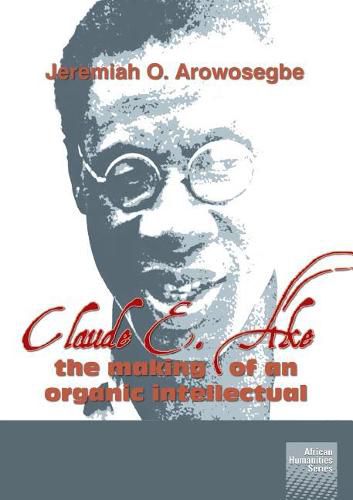Readings Newsletter
Become a Readings Member to make your shopping experience even easier.
Sign in or sign up for free!
You’re not far away from qualifying for FREE standard shipping within Australia
You’ve qualified for FREE standard shipping within Australia
The cart is loading…






This title is printed to order. This book may have been self-published. If so, we cannot guarantee the quality of the content. In the main most books will have gone through the editing process however some may not. We therefore suggest that you be aware of this before ordering this book. If in doubt check either the author or publisher’s details as we are unable to accept any returns unless they are faulty. Please contact us if you have any questions.
Claude E. Ake, radical African political philosopher of the first four decades of the postcolonial era, stands out as a progressive social force whose writings continue to have appeal and relevance long after his untimely death in 1996. In examining Ake’s intellectual works, Jeremiah O. Arowosegbe sets out the framework of his theoretical orientations in the context of his life, and reveals him as one of the most fertile and influential voices within the social sciences community in Africa.
In tracing the genesis and development of Ake’s political thought, Arowosegbe draws attention to Ake’s compelling account of the material implications and political costs of European colonisation of Africa and his conception of a different future for the continent. Approaching his subject from a Gramscian and Marxist perspective, Arowosegbe elucidates how Ake’s philosophy demonstrates the intimate entanglement of class and social, cultural and historical issues, and how, as a contributor to endogenous knowledge production and postcolonial studies on Africa, Ake is firmly rooted in a South-driven critique of Western historicism.
It is Arowosegbe’s conviction that engaged scholars are uniquely important in challenging existing hierarchies, oppressive institutions, and truth regimes - and the structures of power that produce and support them; and much can be drawn from their contributions and failings alike. This work contributes to a hitherto neglected focus area: the impact across the continent of the ideas and lives of African and other global South academics, intellectuals and scholar-activists. Among them, Ake is representative of bold scholarly initiatives in asserting the identities of African and other non-Western cultures through a mindful rewriting of the intellectual and nationalist histories of these societies on their own terms. In foregrounding the contribution of Ake with respect to both autochthonous traditional insights and endogenous knowledge production on the continent, Arowosegbe aims at fostering the continuance of a living and potent tradition of critique and resistance.
Engaging with the lingering impact of colonialism on previously colonised societies, this timely book will be of immense value to scholars and students of philosophy and political science as well as African intellectual history, African studies, postcolonial studies and subaltern studies.
$9.00 standard shipping within Australia
FREE standard shipping within Australia for orders over $100.00
Express & International shipping calculated at checkout
This title is printed to order. This book may have been self-published. If so, we cannot guarantee the quality of the content. In the main most books will have gone through the editing process however some may not. We therefore suggest that you be aware of this before ordering this book. If in doubt check either the author or publisher’s details as we are unable to accept any returns unless they are faulty. Please contact us if you have any questions.
Claude E. Ake, radical African political philosopher of the first four decades of the postcolonial era, stands out as a progressive social force whose writings continue to have appeal and relevance long after his untimely death in 1996. In examining Ake’s intellectual works, Jeremiah O. Arowosegbe sets out the framework of his theoretical orientations in the context of his life, and reveals him as one of the most fertile and influential voices within the social sciences community in Africa.
In tracing the genesis and development of Ake’s political thought, Arowosegbe draws attention to Ake’s compelling account of the material implications and political costs of European colonisation of Africa and his conception of a different future for the continent. Approaching his subject from a Gramscian and Marxist perspective, Arowosegbe elucidates how Ake’s philosophy demonstrates the intimate entanglement of class and social, cultural and historical issues, and how, as a contributor to endogenous knowledge production and postcolonial studies on Africa, Ake is firmly rooted in a South-driven critique of Western historicism.
It is Arowosegbe’s conviction that engaged scholars are uniquely important in challenging existing hierarchies, oppressive institutions, and truth regimes - and the structures of power that produce and support them; and much can be drawn from their contributions and failings alike. This work contributes to a hitherto neglected focus area: the impact across the continent of the ideas and lives of African and other global South academics, intellectuals and scholar-activists. Among them, Ake is representative of bold scholarly initiatives in asserting the identities of African and other non-Western cultures through a mindful rewriting of the intellectual and nationalist histories of these societies on their own terms. In foregrounding the contribution of Ake with respect to both autochthonous traditional insights and endogenous knowledge production on the continent, Arowosegbe aims at fostering the continuance of a living and potent tradition of critique and resistance.
Engaging with the lingering impact of colonialism on previously colonised societies, this timely book will be of immense value to scholars and students of philosophy and political science as well as African intellectual history, African studies, postcolonial studies and subaltern studies.